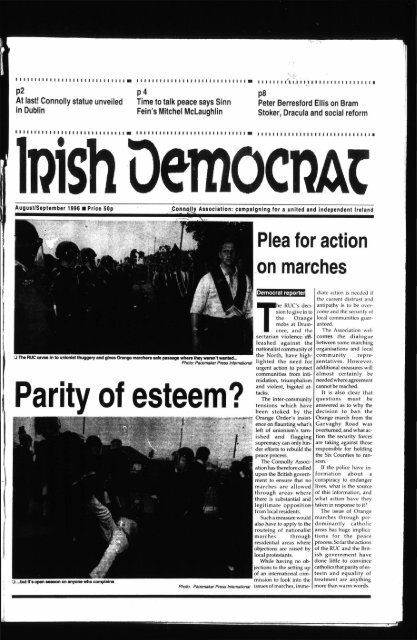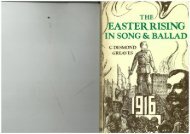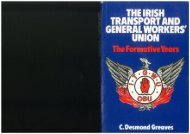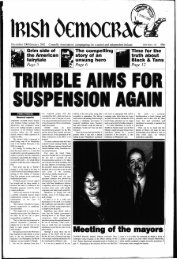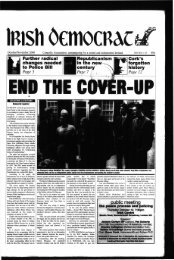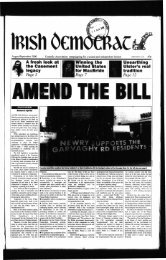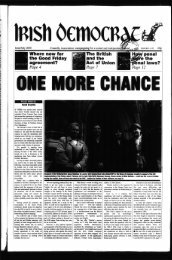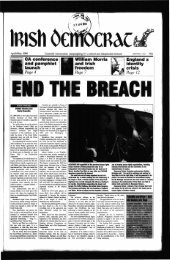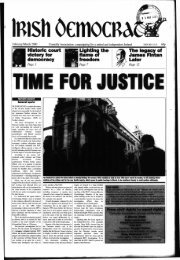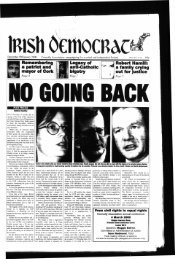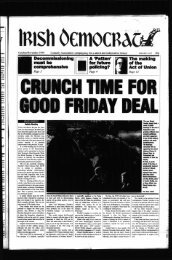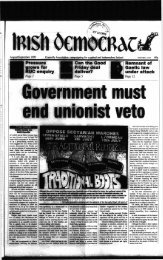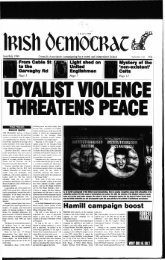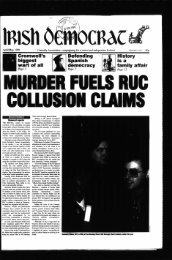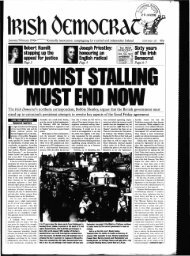Create successful ePaper yourself
Turn your PDF publications into a flip-book with our unique Google optimized e-Paper software.
I >>>> l I i i i i i i i i I I I i i i •<br />
P2<br />
At last! Connolly statue unveiled<br />
in Dublin<br />
11111M11111111111111111111 M •<br />
p4<br />
Time to talk peace says Sinn<br />
Fein's Mitchel McLaughlin<br />
I I I I I I M i l l<br />
II I I I I I I II I I I I I I I I I I<br />
p8<br />
Peter Berresford Ellis on Bram<br />
Stoker, Dracula and social reform<br />
I I I I I I I I I I I I I I I I I I I I I I I I I I | | | • I | | | | | | | | | | | | | | | | | | | I I I I I I I I I I I<br />
toish Demcxmt<br />
<strong>August</strong>/<strong>September</strong> <strong>1996</strong> • Price 50p<br />
ConnoHy Association: campaigning for a united and independent Ireland<br />
Plea for action<br />
on marches<br />
• The RUC caves in to unionist thuggery and gives Orange marchers safe passage where they weren't wanted...<br />
Photo: Pacemaker Press International<br />
Parity of esteem?<br />
• ...but it's open season on anyone who complains<br />
<strong>Democrat</strong> reporte<br />
The RUC's deci<br />
sion to give in to<br />
the Orange<br />
mobs at Drum<br />
cree, and the<br />
. sectarian violence Unleashed<br />
against the<br />
nationalist community of<br />
the North, have highlighted<br />
the need for<br />
urgent action to protect<br />
communities from intimidation,<br />
triumphalism<br />
and violent, bigoted at<br />
tacks.<br />
The inter-community<br />
tensions which have<br />
been stoked by the<br />
Orange Order's insistence<br />
on flaunting what's<br />
left of unionism's tarnished<br />
and flagging<br />
supremacy can only hinder<br />
efforts to rebuild the<br />
peace process.<br />
The Connolly Association<br />
has therefore called<br />
upon the British government<br />
to ensure that no<br />
marches are allowed<br />
through areas where<br />
there is substantial and<br />
legitimate opposition<br />
from local residents.<br />
Such a measure would<br />
also have to apply to the<br />
routeing of nationalist<br />
marches through<br />
residential areas where<br />
objections are raised by<br />
local protestants.<br />
While having no objections<br />
to the setting up<br />
of an international commission<br />
to look into the<br />
Photo: Pacemaker Press International issues of marches, immediate<br />
action is needed if<br />
the current distrust and<br />
antipathy is to be overcome<br />
and the security of<br />
local communities guaranteed.<br />
The Association welcomes<br />
the dialogue<br />
between some marching<br />
organisations and local<br />
community representatives.<br />
However,<br />
additional measures will<br />
almost certainly be<br />
needed where agreement<br />
cannot be reached.<br />
It is also clear that<br />
questions must be<br />
answered as to why the<br />
decision to ban the<br />
Orange march from the<br />
Garvaghy Road was<br />
overturned, and what action<br />
the security forces<br />
are taking against those<br />
responsible for holding<br />
the Six Counties to ransom.<br />
If the police have information<br />
about a<br />
conspiracy to endanger<br />
lives, what is the source<br />
of this information, and<br />
what action have they<br />
taken in response to it?<br />
The issue of Orange<br />
marches through predominantly<br />
catholic<br />
areas has huge implications<br />
for the peace<br />
process. So far the actions<br />
of the RUC and the British<br />
government have<br />
done little to convince<br />
catholics that parity of esteem<br />
and equality of<br />
treatment are anything<br />
more than warm words.
Parity of<br />
esteem?<br />
If there are two lessons to be learned from the<br />
events of Drumcree and their aftermath, the first is<br />
that they have served to expose to the world what<br />
the British Government and the RUC really mean<br />
by 'parity of esteem' and 'equality of treatment 7 .<br />
That the British government and the RUC were<br />
publicly seen to cave in to threats to intensify violence<br />
against catholics has caused widespread anger throughout<br />
the nationalist community and beyond.<br />
However, whatever the disquiet experienced by Sir<br />
Patrick Mayhew and John Major over the role played<br />
by David Trimble at Drumcree, they showed no desire<br />
even to upbraid him for breaking the law or breaching<br />
the Mitchell principles on the use of violence and<br />
force to attain political ends, let alone threaten his<br />
party with exclusion from the talks process.<br />
Just in case any of us missed the point, a few days<br />
later John Major, legitimately concerned about a<br />
possible breakdown in the loyalist ceasefire, invited<br />
members of the new unionist parties for talks at Number<br />
10 Downing Street. The involvement in political<br />
and sectarian violence of some of those involved was<br />
well known to Mr Major and his colleagues.<br />
Whatever our reservations about the PUP or the<br />
UDP, we welcome any genuine commitment to work<br />
for a political solution to the conflict. What is both offensive<br />
and politically suspect, given the unravelling<br />
peace process, is what the meeting says about the British<br />
government's idea of equality of treatment After<br />
all, this is a prime minister who refused to meet Sinn<br />
Fein after the IRA ceasefire and who placed endless<br />
precondition in the way of its inclusion in all-party<br />
talks.<br />
It is a matter of record that the British government<br />
neither insisted that the loyalist paramilitaries hand in<br />
their weapons, nor asked them to guarantee that their<br />
ceasefire was permanent, before allowing them to take<br />
up their place in the Northern Ireland assembly.<br />
Even more galling is the growing belief, at least outside<br />
of the RUC, that at least four recent killings in the<br />
North, including that of catholic taxi driver Michael<br />
McGoldrick, are linked to loyalist paramilitaries. The<br />
disparity of esteem here is manifest.<br />
A second important lesson resulting from Drumcree<br />
is that unionists are attempting to assert their supremacy<br />
from a position of weakness rather than<br />
strength. The Drumcree showdown and the eruption<br />
of violence against catholics and nationalists is all part<br />
of their desperate attempts to hang on to what remains<br />
of their ascendency position. The tide of history is not<br />
flowing their way, and they know it Politically backward-looking,<br />
unionism offers no lasting hope for<br />
protestants. In time, Drumcree may eventually be seen<br />
as the beginning of the end for unionism's supremacy<br />
in the North, rather than the victory some are so keen<br />
to crow about.<br />
Unfortunately, the resumption of the IRA's military<br />
campaign has thrown a life-line to divided unionists<br />
and the sorry remnants of a fading, and increasingly<br />
inept, Tory administration. There is again tremendous<br />
potential for political advance on the <strong>Irish</strong> question in<br />
both Britain and Ireland following the events of Drumcree.<br />
However, any advances today could just as<br />
quickly be swept aside tomorrow by the next IRA<br />
bombing, particularly if it's target like Manchester.<br />
Republicans should be in no doubt that those of us<br />
in Britain who have consistently supported and campaigned<br />
for a political solution to the <strong>Irish</strong> crisis see<br />
no justification for a resumption of the IRA's military<br />
campaign. It undermines the need to build the maximum<br />
unity between nationalist, republican and progressive<br />
forces in Ireland and hinders all attempts to<br />
broaden the campaign for <strong>Irish</strong> democracy in Britain.<br />
• DG<br />
toish DeraocuAc<br />
BI-MONTHLY NEWSPAPER OF<br />
THE CONNOLLY ASSOCIATION<br />
Founded 1939. Volume 51, number 2<br />
Editorial board: Helen Bennett; Gerard Curran;<br />
David Granville (editor); Jonathan Hardy; Peter<br />
Mulligan; Alex Reid Moya Fenz St Leger.<br />
Production: Derek Kotz<br />
PUBLISHED BY: Connolly Publications Ltd, 244<br />
Gray's Inn Road, London WC1X 8JR, telephone<br />
0171 833 3022.<br />
PRINTED BY: Ripley Printers (TU) Ltd, Nottingham<br />
Road, Ripley, Derbyshire, telephone 01773<br />
743 621.<br />
HEADLINES<br />
Connolly statue unveiled<br />
Dublin trades<br />
unionists and<br />
people throughout<br />
Ireland can feel<br />
proud in<br />
honouring the<br />
great labour leader<br />
James Connolly,<br />
reports CHARLIE<br />
CUNNINGHAM<br />
JAMES CONNOLLY was<br />
not just a trade union organiser,<br />
for that is how he<br />
earned his living, but also a<br />
political analyst, one of the<br />
foremost socialist thinkers of<br />
this century, a poet, historian,<br />
playwright, songwriter, and<br />
revolutionary who paid the ultimate<br />
price for his act of patriotic<br />
defiance.<br />
Recognition of his importance<br />
and influence continues<br />
to grow, both at home and<br />
abroad. His name is revered<br />
throughout Ireland with<br />
schools, roads squares, railway<br />
stations, office buildings<br />
and hospitals named after him,<br />
and now, eighty years since his<br />
execution, a fine statue has<br />
been erected outside Liberty<br />
Hall at the place where Connolly<br />
addressed many meetings<br />
of Dublin's trade<br />
unionists and socialists.<br />
In Britain, Connolly quotes<br />
have also appeared on the<br />
notepaper of striking Merseyside<br />
dockers, on the member-<br />
Fine Gael gains support<br />
Opinion poll<br />
<strong>Democrat</strong> reporter<br />
JOHN BRUTON and Fine<br />
Gael have achieved their<br />
highest ratings, and the<br />
Labour Party its lowest, since<br />
the last <strong>Irish</strong> general election<br />
according to a recent opinion<br />
poll.<br />
The general support for the<br />
<strong>Irish</strong> Labour Party has plummeted<br />
to ten per cent. If this<br />
were maintained at the next<br />
general election, Labour<br />
would lose half its Dublin<br />
seats.<br />
According to the poll, Fianna<br />
Fail has 47 per cent support,<br />
Fine Gael 26 per cent,<br />
Labour 10 per cent, Progressive<br />
<strong>Democrat</strong>s seven per<br />
cent, <strong>Democrat</strong>ic Left two per<br />
cent, Green Party three per<br />
cent, others five per cent.<br />
The poll exemplifies the<br />
pattern of the old law established<br />
in 1948,1973 and again<br />
in 1995, — that by joining with<br />
Fine Gael in coalition Labour<br />
revives the latter, while dooming<br />
itself to decline. On the last<br />
occasion Labour ministers<br />
were all inclined to soldier on<br />
government with Fianna Fail,<br />
after Albert Reynold's resignation.<br />
But Dick Spring said no.<br />
Spring's nose was out of<br />
joint because of the kudos Fianna<br />
Fail seemed to be getting<br />
from the peace process, and he<br />
wanted to have sole charge of<br />
running that. The opinion<br />
polls already show what a mistake<br />
he made.<br />
Eighth Desmond Greaves Summer School<br />
Sessions include: Professor Terry Eagleton, Oxford, on The<br />
Ideology of <strong>Irish</strong> Studies; Di C hristopher Woods, Maynooth,<br />
on Tone and Russell, The Parting of Friends; Frankie<br />
Watson, Lei trim, on Teaching <strong>Irish</strong> History in Schools;<br />
Kevin McCorry, Belfast, on The Way Forward Now in the<br />
Six Counties.<br />
Friday to Sunday, <strong>August</strong> 23-25; <strong>Irish</strong> Labour History Society<br />
Museum, Beggars Bush, Dublin 4; Full School £12. Enquiries<br />
to Micheal O Loingsigh, Summer School Director,<br />
82 Barton Road East, Dublin 14; Tel: 298 5315.<br />
IRISH DEMOCRAT A u g u i t / S i p t i m b i r 1 9 9 6 page 2<br />
Photo: Charlie Cunningham<br />
ship card of the Socialist Labour<br />
Party and in the programme<br />
of the Chesterfield<br />
May Day event<br />
Unveiling the statue, <strong>Irish</strong><br />
President Mary Robinson<br />
stressed that Connolly, a<br />
champion of women's rights,<br />
would have been happy that<br />
she would have the honour of<br />
unveiling the statue.<br />
Connolly had recognised<br />
the value of the full participation<br />
of women and young<br />
people in society. In 1902 he<br />
had delivered an election address<br />
to Jewish workers in<br />
Yiddish as a mark of respect to<br />
an important minority, she<br />
said.<br />
Connolly's testament was<br />
"a challenge to us to move forward,<br />
not as a society where<br />
the divide was widening, but<br />
as a people with a strong sense<br />
of community".<br />
Other speakers at the ceremony<br />
included senior representatives<br />
from the American<br />
trade union centre AFL-CIO,<br />
<strong>Irish</strong> trade unions organisations<br />
and James' grandson,<br />
Ross Connolly.<br />
Special consideration was<br />
also given to members of the<br />
Connolly family and to the surviving<br />
members of the Connolly<br />
Column who fought with<br />
the republican forces in the<br />
Spanish Civil War.<br />
As heirs to the aspirations<br />
of Connolly — that working<br />
people should be masters of<br />
their own destiny, and if this is<br />
not yet attainable, that they<br />
should at least be the main contenders<br />
for power — it remains<br />
evident that the<br />
overriding barrier to progress<br />
in Ireland remains imposed<br />
disunity.<br />
In 1914 Connolly correctly<br />
predicted that partition would<br />
unleash a 'carnival of reaction',<br />
set back the oncoming unity of<br />
the <strong>Irish</strong> Labour movement<br />
and paralyse all advanced<br />
movements while it endured.<br />
Recent events have only<br />
served to reinforce how much<br />
of what he said remains true<br />
today.<br />
<strong>Irish</strong> in Britain die younger<br />
Health<br />
<strong>Democrat</strong> reporter<br />
<strong>Irish</strong> men and women born in<br />
Britain are less healthy and<br />
die younger than the rest of<br />
the population, according to a<br />
recent British Medical Journal<br />
report.<br />
The early death-rate among<br />
first-generation <strong>Irish</strong> immigrants<br />
exceeds that of British<br />
men by 30 per cent and British<br />
women by 20 per cent, with the<br />
majority dying from cancer<br />
and heart problems.<br />
Some of this is due to lifestyle<br />
factors such as smoking<br />
and heavy drinking, but the<br />
BMJ article suggests that the<br />
ease of migration from Ireland<br />
to Britain may have encouraged<br />
less healthy people to<br />
move.<br />
The curious thing is that the<br />
adverse pattern among firstgeneration<br />
<strong>Irish</strong> immigrants<br />
continues into the second<br />
generation, who number more<br />
than two million people.<br />
Among the reasons the article<br />
suggests are poverty and<br />
poor housing, as well as exposed<br />
and dangerous employment<br />
on building sites.<br />
Donations to the Connolly Association and the<br />
<strong>Irish</strong> <strong>Democrat</strong> May 12 — July 11<strong>1996</strong><br />
J. Morrissey £29; G.F. £15; A. Higgins £11.60; E. Doyle £20; M.<br />
Melly £5; J. Egan £2.50; C.C. Knight £2.50; M. Brennan; £10;<br />
G.C. Campbell £5; F. Jennings £15; A. Barron £10; H. Smith<br />
£12.50; Paisley supporters £7; J.C. Delage £25; W. Booth £10;<br />
J. Grace £15;; K. Galley £5; R. Doyle £5; O. Cahn £5; Cllr R.<br />
McCormick £10, R. Smith £5; M. Loughran £15; J. Flemming<br />
£20; S MacLennan £5; B. Feeney £5; J.& M. Nolan £6; M. Folan<br />
£5, AJ. Kenny £15; P.C. Walsh £10; Liz Goulding (in memory<br />
of Harry Goulding) £5; P. McLoughlin (In memory of Desmond<br />
Greaves & Paddy Bond) £10; Anon £3.50; Customers<br />
donations £16.80; Collection at London meeting £16.<br />
Bankers' orders £335.05 (2 montsh)<br />
TOTAL £692.45<br />
HEADLINES<br />
Labour movement looks<br />
towards options for peace<br />
• Ken Livingstone and Ann! Marjoram at July's Agreed Ireland Forum conference<br />
Pic: David Granville<br />
Labour movement<br />
<strong>Democrat</strong> reporters<br />
THE IRISH peace process is<br />
not over, but it will be<br />
long, slow and painful,<br />
Labour MP Cli ve Soley told the<br />
Options for a Lasting Peace in<br />
Ireland conference held in London<br />
recently.<br />
Organised by the Agreed<br />
Ireland Forum, the conference,<br />
which was sponsored by a<br />
number of trade unions, the<br />
Scottish TUC and the <strong>Irish</strong><br />
Post, successfully brought<br />
together around 200 participants<br />
from the British and <strong>Irish</strong><br />
labour movements and campaign<br />
organisations.<br />
Issues discussed by delegates<br />
included policing in a<br />
divided society, women's<br />
rights and peace, economic regeneration<br />
in an all-Ireland<br />
context, prisoners, employment<br />
equality, sectarianism in<br />
the workplace, civil liberties<br />
and the experience of the <strong>Irish</strong><br />
in Britain.<br />
Speaking at the opening<br />
session, Clive Soley said that<br />
the explosions and the arms<br />
find in County Laois had been<br />
a serious setback to the peace<br />
process.<br />
He defended Labour's policy<br />
of 'unity by consent' as one<br />
of the few party policies that<br />
had survived since 1981. "Labour's<br />
task will be to address<br />
the real lack of trust between<br />
the two communities," he said,<br />
adding that no party should<br />
have a veto.<br />
SDLP vice chair Marietta<br />
Farrell condemned the Manchester<br />
bombing, but said that<br />
her party would continue to<br />
talk to Sinn Fein. In common<br />
with many contributors from<br />
both Britain and Ireland she<br />
criticised Labour bi-partisan<br />
policy on Ireland.<br />
Sinn Fein national chair<br />
Mitchel McLaughlin reiterated<br />
his party's commitment to<br />
democratic and peaceful<br />
methods. He called on both<br />
governments to direct their energies<br />
into creating the political<br />
conditions that could lead<br />
to a renewal of the IRA ceasefire<br />
and the start of meaningful<br />
and inclusive talks.<br />
Identifying the political<br />
weakness of the Tory government<br />
as the key obstacle to ensuring<br />
a viable peace process<br />
he appealed to Tony Blair to<br />
negotiate with John Major to<br />
secure a new, positive bi-partisan<br />
approach to Ireland. "An<br />
irrevocable peace process<br />
could be put in place within a<br />
matter of months if all of us<br />
take our mutual responsibilities<br />
seriously," he told delegates.<br />
Mr McLaughlin's contribution<br />
followed a vitriolic attack<br />
on the Republican Movement<br />
by Brian Fitzgerald TD, speaking<br />
on behalf of the Tanaiste<br />
Dick Spring.<br />
Blaming republicans for the<br />
breakdown in the ceasefire, his<br />
200 mark Chartist leader's life<br />
Bronterre O'Brien<br />
<strong>Democrat</strong> reporter<br />
THE WORST thing anyone<br />
can do in the face of oppression<br />
is submit to it,<br />
British miners' leader Arthur<br />
Scargill told 200 people gathered<br />
in east London's Abney<br />
Park cemetery in June to commemorate<br />
the life of Bronterre<br />
O'Brien.<br />
As the grandson of an <strong>Irish</strong><br />
immigrant, Mr Scargill said<br />
that the great Chartist leader,<br />
who died in poverty in 1864,<br />
held a special place in his affections.<br />
He told the gathering at<br />
O'Brien's graveside of his<br />
growing disillusionment with<br />
Tony Blair's 'new Labour',<br />
which he said had rejected socialism.<br />
He added that Labour policy<br />
on Ireland was now no different<br />
than that of the Tories.<br />
Peter Berresford Ellis, the<br />
historian, novellist and <strong>Irish</strong><br />
<strong>Democrat</strong> columnist, reminded<br />
the audience of the support<br />
that the National Union of<br />
Mineworkers had given to Ireland's<br />
long struggle against<br />
imperialism.<br />
He recalled that an earlier<br />
miners' leader, Arthur Horner,<br />
as a young man was one of a<br />
contingent of South Wales<br />
miners who offered their services<br />
to the <strong>Irish</strong> Citizens'<br />
Army during the War of Independence.<br />
Some had died, while<br />
others, including Homer, were<br />
contribution was in marked<br />
contrast to the majority of participants,<br />
even those critical of<br />
Sinn Fein and the IRA, and received<br />
little support from delegates.<br />
.<br />
Labour MP Ken Livingstone<br />
told the conference that<br />
the mortar bomb attack in Osnabruck<br />
signalled the end of<br />
the peace process.<br />
"The opportunity for peace<br />
had been lost due to the machinations<br />
of John Major," he told<br />
delegates.<br />
Mr Livingstone urged the<br />
Labour left to 'establish a dialogue'<br />
with working-class<br />
unionists' in much the same<br />
way that dialogue had been established<br />
previously with republicans.<br />
Fianna Fail spokesperson<br />
on prisoners Eamon O Cuiv<br />
TD reminded delegates that<br />
the struggle of the past 27 years<br />
"had not been a one-sided<br />
catalogue of IRA atrocities, but<br />
a two-sided problem" which<br />
had arisen as a result of partition.<br />
While accepting that nothing<br />
could change without the<br />
consent of the unionist people,<br />
he stressed that, "nothing<br />
could remain the same without<br />
the consent of the nationalist<br />
people of Ireland, north and<br />
south."<br />
"That means that we as a<br />
. people north and south have to<br />
come to a new mutual accommodation,"<br />
he said. "We have<br />
to come up with a unique solution<br />
for our particularly<br />
unique problem." This would<br />
require inclusive talks with the<br />
only preconditions being set<br />
by independent, international<br />
arbiters.<br />
Shadow Northern Ireland<br />
secretary Mo Mowlam MP,<br />
who had been scheduled to attend,<br />
backed out at the last<br />
minute to attend another engagement<br />
in Manchester.<br />
In a message to the conference<br />
Ms Mowlam said the<br />
Labour Party was committed<br />
to building reconciliation<br />
within Northern Ireland and<br />
building "unity of the peoples"<br />
of Ireland.<br />
captured and imprisoned.<br />
"That was true internationalism.<br />
That was the workingclass<br />
solidarity envisaged by<br />
Bronterre O'Brien," said Mr<br />
Berresford Ellis.<br />
To laments on the uilleart<br />
pipes playeu by Wexfordman<br />
Paul Garten, wreaths were laid<br />
on behalf of the Connolly Association,<br />
the Bronterre<br />
O'Brien Committee, the Longford<br />
Exiles, the Longford Association<br />
in London, Conradh na<br />
Gaeilge and the Abney Park<br />
Cemetery Trust.<br />
OPINION<br />
On not keeping<br />
our heads down<br />
CAN I press you to a Wolfe Tone mug?" I was<br />
chancing my luck for the fifth time at the<br />
Four Provinces bookstall at this year's <strong>Irish</strong><br />
Book Fair. The tall aesthetic-looking <strong>Irish</strong><br />
man laughed. He was casting a discerning<br />
eye over the <strong>Irish</strong>-language manuals.<br />
Our ensuing conversation was different from most<br />
at the bookstall, when the customer relaxes into a personal<br />
saga of life in Britain or a scholarly reflection on<br />
<strong>Irish</strong> history and literature, always intriguing for sales<br />
staff but bad for turnover! My irresponsibly long conversation<br />
with the aforesaid <strong>Irish</strong>man, a plasterer by<br />
trade, sparked off a train of thought I'd like to share<br />
with <strong>Democrat</strong> readers.<br />
Like so many of his generation he had no university<br />
education, but demonstrated the comprehensive<br />
understanding of <strong>Irish</strong> history and sophisticated<br />
powers of political analysis which mark out the <strong>Irish</strong>man<br />
of integrity. I asked if he belonged to any group.<br />
He did not. Years ago in London he had been a regular<br />
reader of the <strong>Irish</strong> <strong>Democrat</strong> but had moved away to a<br />
town where it was not on sale.<br />
I suggested he might like to join the Connolly Association,<br />
receive the paper and keep in touch with<br />
people who were as well informed as himself. He prevaricated<br />
but began explaining his hesitation in lowered<br />
tones. "You've got to understand," he said,<br />
"how do you think the <strong>Irish</strong> have survived over here?<br />
By keeping our heads down. A long time ago I didn't<br />
and they put me in prison for seven years."<br />
I caught my breath. It was the old story. "Was it political?"<br />
I asked. "They charged me with conspiracy to<br />
rob...to fund terrorism." I did not need any more detail.<br />
All I felt again was gratitude and respect. You are<br />
innocent until proved <strong>Irish</strong>: the old maxim remains as<br />
true today as it ever was.<br />
But let us reflect for a moment on the notion that<br />
the <strong>Irish</strong> have to keep their heads down 'to survive'.<br />
At some point in life, every man and women, both<br />
fiist and second generations, living in what they call<br />
the UK has to take a decision which, once taken, affects<br />
the quality of life. The question every <strong>Irish</strong> man<br />
and woman has to face is this: do I stand up for the ending<br />
of British sovereignty in Ireland, or do I keep my<br />
head down for a quiet life?<br />
Facing this question poses a lifelong challenge for<br />
many <strong>Irish</strong> people, and when it crops up justification<br />
is rife: 'we have to think of the children'; 'it wouldn't<br />
do if their father was a known troublemaker'; 'I have<br />
to think of my job...promotion...pension'; 'I'm not political'.<br />
Understandable, but I have yet to meet an <strong>Irish</strong><br />
man or woman who adopts a genuinely neutral stance<br />
on the political future of Ireland.<br />
The scene has changed. Eighteen months of ceasefire<br />
have created, for the first time in a quarter of a century,<br />
a period of respite from the underlying fears<br />
which keep <strong>Irish</strong> heads below the parapet. The end of<br />
the ceasefire should not be allowed to rob the <strong>Irish</strong><br />
community of the relief that has enabled us to speak<br />
openly and unambiguously to our friends about the urgent<br />
political necessity for a constitutional settlement<br />
establishing a united and independent Ireland.<br />
The great challenge of the Connolly Association<br />
and other organisations have to meet in the coming<br />
months is that of encouraging <strong>Irish</strong> people and the<br />
friends of Ireland to take a more active stance.<br />
Enabling <strong>Irish</strong> people and their allies in this<br />
country to cling to and build upon this new-found<br />
openness, despite the sudden downturn of hope,<br />
needs the co-operation of every individual member of<br />
the <strong>Irish</strong> community and our friends in the labour<br />
movement We must support anyone who in the last<br />
18 months has peeped out of the safety of his or her<br />
home to wave a metaphorical tricolour in support of<br />
<strong>Irish</strong> unity.<br />
For an <strong>Irish</strong>-born citizen to raise his or her head<br />
above the parapet is an act of supreme courage in a<br />
country where the PTA keeps the whole community<br />
disenfranchised from democracy.<br />
Support can be given in simple, personal ways<br />
which CA members might like to suggest by writing<br />
in to the <strong>Democrat</strong> There is talk of a return to the status<br />
quo of the last 25 years. We cannot allow this to happen.<br />
Political empowerment is not dispensed from<br />
above but nurtured at home, in the workplace and in<br />
pub and club. It is for us to ensure that the years of life<br />
my new plasterer friend spent in prison ultimately<br />
prove to be witness, not waste.<br />
• Moya Frenz St Leger<br />
IRISH DEMOCRAT Augu• t / <strong>September</strong> 1 9 9 6 page 3
DEBATE<br />
BEHIND THE HEADLINES<br />
J Mitchel McLaughlin<br />
Photo: David Granville<br />
Time to talk -<br />
time for peace<br />
Sinn Fein chair<br />
MITCHEL<br />
MCLAUGHLIN<br />
outlined his<br />
party's stance on<br />
reviving the peace<br />
process at the<br />
recent Agreed<br />
Ireland Forum<br />
event in London.<br />
On this page is an<br />
edited account of<br />
what he said<br />
WE MEET at a particularly<br />
difficult time and<br />
it would be easy to despair,<br />
but I think that those who<br />
want to see democratic structures<br />
emerge from the scenario<br />
of conflict that has lasted for<br />
many generations in Ireland<br />
must never say surrender.<br />
We have all been challenged<br />
and credibility is an<br />
issue for all parties. The failure<br />
to consolidate the opportunity<br />
that emerged so dramatically<br />
in <strong>August</strong> 1994 is a collective<br />
failure.<br />
Sinn Fein always knew that<br />
making peace, attempting to<br />
undo the wrongs of centuries,<br />
was never going to be easy.<br />
What we are attempting to do<br />
is very ambitious, as well as<br />
risky and dangerous. We are<br />
seeking for the first time in<br />
<strong>Irish</strong> history, and in the relationship<br />
between Ireland and<br />
Britain, to successfully resolve<br />
the deep-rooted issues that lie<br />
at the heart of the conflict.<br />
The unity and independence<br />
of Ireland as a sovereign<br />
state is the first aim of<br />
<strong>Irish</strong> republicans. It is a considered<br />
preference of a clear<br />
majority of the people of Ireland<br />
and is a reasonable, legitimate<br />
and identified option,<br />
one that has been denied us as<br />
a matter of British policy, and<br />
as a people, for far too long.<br />
Sinn Fein is absolutely committed<br />
to democratic and<br />
peaceful methods of resolving<br />
these problems and is resolutely<br />
determined to achieve an<br />
equitable and lasting agreement<br />
which can command the<br />
allegiance and consent of all<br />
the people of Ireland.<br />
We remain hopeful that a<br />
meaningful negotiation process<br />
will commence. The challenge<br />
for all parties, and for<br />
both governments, is to create<br />
the political conditions where<br />
the necessary negotiations will<br />
be conducted in both a peaceful<br />
environment and manner.<br />
Clearly these conditions do<br />
not exist at present Equally<br />
clearly, they will not be created<br />
by discriminating against any<br />
constituency or by excluding<br />
whole sections of the electorate.<br />
Republicans, quite<br />
properly, and loyalists have<br />
acknowledged the hurt for<br />
which they have been responsible.<br />
In order for us all to move<br />
towards a new beginning, it is<br />
time that the mainstream<br />
unionist parties acknowledged<br />
their responsibilities<br />
for the institutionalised violence<br />
and injustices in the<br />
North.<br />
The British Government<br />
must also accept responsibility<br />
for the hurt that they have inflicted<br />
on the <strong>Irish</strong> nation, particularly<br />
during the last 27<br />
years when over 1,000 <strong>Irish</strong><br />
people have been killed by uniformed<br />
servants of the British<br />
crown.<br />
When we can all accept responsibility<br />
for our part in the<br />
conflict and recognise the hurt<br />
of others, instead of apportioning<br />
blame to others, then we<br />
will be able to sit down<br />
together and reach a democratic<br />
accommodation.<br />
All parties, including Sinn<br />
Fein, accept that the only way<br />
to achieve a lasting peace is<br />
through inclusive and intensive<br />
negotiations. With the<br />
entry to negotiations election<br />
over, the <strong>Irish</strong> and British government's<br />
remain deadlocked<br />
with the mainstream unionist<br />
parties over what is being portrayed<br />
as a dispute over the details<br />
of procedure and agenda.<br />
In fact, it is simply the latest<br />
attempt by the unionists to dictate<br />
and dominate every aspect<br />
of the proceedings.<br />
Surely all of the energies,<br />
especially those of both governments,<br />
should be directed<br />
towards restoring confidence<br />
in the political process to those<br />
who have despaired, or those<br />
who, because of the failure of<br />
the past two years, have had<br />
their views on armed struggle<br />
reinforced rather than challenged.<br />
THE QUESTION of politically<br />
motivated violence is<br />
clearly an issue which<br />
must be resolved, as all other<br />
issues, to the satisfaction of all<br />
sides. Dialogue and negotiations<br />
between all of the parties<br />
and both governments is<br />
surely the most reasonable and<br />
realistic means of resolving<br />
these matters.<br />
When one considers the<br />
shambles and squabbles at<br />
Stormont it is obvious that the<br />
<strong>Irish</strong> and British governments<br />
have failed to revive the peace<br />
process. Indeed, they have created<br />
additional problems by<br />
imposing elections as a socalled<br />
gateway to negotiations<br />
and then refusing to accept the<br />
democratic result of the ballot<br />
box.<br />
Sinn Fein represents, not<br />
the IRA, but 15.5 per cent of the<br />
electorate in the north of Ireland<br />
. To shut out Sinn Fein's 17<br />
elected negotiators is the equivalent<br />
of locking 100 MPs out<br />
of the House of Commons. Is<br />
this a democratic peace process?<br />
To convince the IRA to reinstate<br />
the cessation will require,<br />
not threats and exclusion and<br />
blackmail, but a consistent<br />
defence by the sponsoring governments<br />
of democratic principles<br />
and an unqualified<br />
respect for the electoral mandate.<br />
In addition, explicit guarantees<br />
should be issued by both<br />
governments that the negotiations,<br />
which the IRA is on record<br />
as calling for and<br />
supporting, will be inclusive,<br />
meaningful and focussed. The<br />
statements by John Major and<br />
his ministers in recent weeks<br />
blatantly set aside these elements<br />
which are crucial motivating<br />
arguments<br />
THE RESUMPTION of the<br />
IRA campaign has obviously<br />
created additional<br />
difficulties in achieving proper<br />
negotiations. But responsibility<br />
for the continuing impasse<br />
in the peace process can<br />
be traced back directly to the<br />
stance adopted by John Major<br />
and his colleagues.<br />
These issues remain at the<br />
heart of the difficulties in arguing<br />
for a restoration of the<br />
cessation and must be addressed<br />
in a realistic fashion.<br />
The extent of John Major's<br />
reliance on the unionist block<br />
vote, and what that represents,<br />
is an infinitely greater obstacle<br />
to achieving peace in Ireland. It<br />
is a matter which British politicians,<br />
including those in the<br />
British Labour Party, will have<br />
to address and resolve.<br />
In the event of a Labour victory<br />
at the next election, what<br />
are the prospects of a Labour<br />
government pursuing a democratic,<br />
practical and flexible<br />
course?<br />
Labour front bench spokespersons<br />
have been at pains to<br />
emphasise that no party in the<br />
north of Ireland should be<br />
waiting for a Labour administration<br />
to embark upon a radical<br />
departure from John<br />
Major's policy on the peace<br />
process. Their present bi-partisan<br />
policy, which seems to indicate<br />
that this present<br />
miserable government, having<br />
done everything else so disastrously<br />
wrong has somehow<br />
got it right on Ireland, defies<br />
common sense and logic.<br />
The bi-partisan policy has<br />
been a sham and a fraud which<br />
has made no credible contribution<br />
to resolving the peace process.<br />
Ireland is the only issue<br />
on which John Major and Tony<br />
Blair have identical positions.<br />
This might be understandable,<br />
or at least defensible, if the policy<br />
was working but it is hard<br />
to justify when it manifestly is<br />
not.<br />
If Labour is perverse<br />
enough to follow the Tories up<br />
what is clearly a political blind<br />
alley in opposition, what will<br />
they do in government?<br />
Over the last two years John<br />
Major has not been without options,<br />
unfortunately he has<br />
been without the imagination<br />
to realise this; consequently it<br />
has become more and more obvious<br />
that he and his government<br />
are the fatal weak link in<br />
a chain of political forces that<br />
are necessary to make up a<br />
viable peace process.<br />
If the Tories won't move an<br />
election date will Tony Blair<br />
think the unthinkable and<br />
negotiate with John Major?<br />
Would Labour put an overriding<br />
priority on peace in Ireland,<br />
even if it meant accepting<br />
that for the remaining nine<br />
months of this government,<br />
that there is only the very outside<br />
possibility that they can<br />
face an election on their terms?<br />
Such an extension of bi-partisanships,<br />
whilst unprecedented,<br />
would not be<br />
impossible or unreasonable,<br />
and, I believe, would be in Labour's<br />
interest. The immediate<br />
benefits being that the leverage<br />
of the Tory backbenchers and<br />
the unionists would be<br />
removed at a stroke, while the<br />
Tory rebels would be neutralised<br />
on European issues<br />
and the <strong>Irish</strong> peace process for<br />
the remainder of this government.<br />
It would strengthen the<br />
authority of the British government<br />
at a crucial moment in<br />
<strong>Irish</strong> political affairs and<br />
would prevent the unionists<br />
and their Tory allies from sabotaging<br />
the possibility of a<br />
renewed IRA cessation by imposing<br />
ever escalating preconditions.<br />
Such a radical departure for<br />
British politicians would inject<br />
enormous confidence to all<br />
those striving to rebuild the<br />
<strong>Irish</strong> peace process.<br />
The recent co-operation of<br />
the government and the opposition<br />
parties ensured the swift<br />
passage of the entry to negotiations<br />
legislation, which was<br />
achieveded despite the stalling<br />
actions of the unionists and<br />
their supporters on the right<br />
wing of the Tory party. Why<br />
not then extend and deepen<br />
the existing bi-partisan policy<br />
if it can create the dynamic<br />
which has up to now been missing<br />
in Westminster on the<br />
<strong>Irish</strong> peace process<br />
UNTIL ALL sides recognise<br />
and accept that they<br />
cannot dictate either the<br />
present or the future on their<br />
own exclusivist terms terms<br />
nothing is going to change for<br />
the better in the north of Ireland.<br />
The future of Ireland belongs<br />
to the people of Ireland.<br />
It is not something which can<br />
be bartered, bordered, proscribed<br />
or consented to in any<br />
formula that ignores the<br />
wishes and the aspirations of<br />
any sector of our people.<br />
Consent will be founded on<br />
consensus, not majoritarianism,<br />
no matter how camouflaged.<br />
Sinn Fein is convinced<br />
that peace is attainable, and in<br />
a relatively short time, if all<br />
sides work creatively towards<br />
it.<br />
We are ready for peace and<br />
will discuss every option, explore<br />
every issue with every<br />
other participant to the conflict.<br />
If we all want peace we<br />
are all going to have to make<br />
commitments to others as well<br />
as ourselves, to our communities<br />
and our children's future.<br />
None of us can afford to<br />
squander what may be the last<br />
opportunity for this generation<br />
to reach a democratic<br />
compromise in Ireland.<br />
Now is the time for the posturing<br />
on all sides to stop. No<br />
more violence, no more exclusion,<br />
no more coercion when<br />
persuasive argument will attain<br />
the same. It's time for all<br />
sides to be pragmatic and<br />
generous. It's time to talk. It's<br />
time for peace.<br />
Paisley rules UK?<br />
It would be a<br />
mistake to label the<br />
British<br />
government as<br />
wimps for its<br />
craven submission<br />
to the Orangemen<br />
at Drumcree<br />
argues our Six<br />
County<br />
correspondent<br />
BOBBIE<br />
HEATLEY<br />
SETTING ASIDE the feeble<br />
excuse of blaming the<br />
chief constable of the<br />
RUC, Major and Mayhew's response<br />
to the events at Drumcree<br />
has provided the history<br />
of English/<strong>Irish</strong> relations with<br />
yet another defining moment;<br />
one, this time, which cannot be<br />
misunderstood, misrepresented,<br />
or excused away.<br />
Their double-dealing and<br />
hypocrisy has been exposed in<br />
one fell swoop. They want the<br />
Six Counties as it is, uniformed.<br />
Yet to describe their behaviour<br />
as wimpish is to suggest<br />
that they are in a different and<br />
superior political camp to the<br />
quagmire occupied by Paisley<br />
and Trimble. It would imply<br />
that at Drumcree they were<br />
forced to do something which<br />
went against their will.<br />
How anyone can still believe<br />
this nonsense after the<br />
'achievements' of successive<br />
British governments over the<br />
past 27 years is beyond understanding.<br />
July 11<strong>1996</strong> ought to<br />
have changed all that.<br />
This particular Tory government<br />
is especially indictable.<br />
It squandered 18 months<br />
of an IRA ceasefire by refusing<br />
to bring about all-party talks<br />
and then, when it had caused<br />
the collapse of the ceasefire,<br />
used this as an excuse not to<br />
talk.<br />
Instead, it set up a ridiculous<br />
assembly in the North —<br />
another arena for squabbling<br />
over nothing — which after<br />
more than a month registered<br />
as its sole achievements prolonged<br />
rows over who should<br />
sit where, the suitability or not<br />
of a stand-in chairperson, and<br />
whether or not the 'union' flag<br />
should be flown over the<br />
building during sittings.<br />
The British government's<br />
money-saving exchequer is<br />
uncomplainingly funding this<br />
farce to the tune of £100 per<br />
sitting for each of the 110 delegates,<br />
plus overhead costs.<br />
• Paisley: rabble-rousing support for colonial rule<br />
The other great Mayhew/Major<br />
contribution has<br />
been to achieve by a slick<br />
sleight of hand the transformation<br />
of all-party talks into<br />
multi-party talks.<br />
Again, after more than a<br />
month, their achievement<br />
speaks for itself: a bitter row<br />
over who should chair the proceedings,<br />
coupled with unionist<br />
attempts to hijack both the<br />
procedures and the agenda.<br />
With nothing achieved on<br />
these issues, Trimble and Paisley<br />
felt a compelling necessity<br />
to walk out and attend to other<br />
matters at Drumcree. Not even<br />
Tory politicians like Andrew<br />
Hunter could describe these<br />
actions as intended to foster social<br />
harmony and promote<br />
'parity of esteem'.<br />
The all-party had become<br />
multi-party talks through the<br />
exclusion of Sinn Fein, despite<br />
its 15 per cent vote in the government-rigged<br />
election which<br />
was held ostensibly as a 'direct<br />
route into talks'. The reason:<br />
Sinn Fein is associated with<br />
those involved in violence.<br />
The 'pacifists' who organised<br />
the siege of Drumcree<br />
and the street terror and pogroms<br />
throughout the rest of<br />
the month could not possibly,<br />
according to Mayhew and<br />
Major, sit down with those<br />
who use violence for political<br />
ends.<br />
British security forces in the<br />
North, including reservists,<br />
amounting to 18,500 military<br />
and 13,000 police were unable<br />
to protect and uphold the civil<br />
rights of a small nationalist<br />
community which was threatened<br />
by coat-training<br />
Orangemen whose purpose,<br />
according to Trimble was symbolic<br />
— the exercise of supremacy.<br />
All the Orangemen were<br />
being asked to do was to make<br />
a small detour so as to avoid<br />
giving offence. The Metropolitan<br />
police would safeguard the<br />
residents of Brixton in the face<br />
of a National Front march, but<br />
for the British government to<br />
act with consistency in Northern<br />
Ireland would be to<br />
threaten the existence of the<br />
British state itself.<br />
THE CLIMB-DOWN was<br />
not a mere matter of<br />
wimpishness; it involved<br />
cold, calculated, political rationale.<br />
The apparent inconsistency<br />
of the British<br />
government when consent 4nd<br />
non-coersion is involved is explainable:<br />
consent and noncoersion<br />
only apply to<br />
Orangemen and unionists, as<br />
does its objection to the use of<br />
violence for the achievement of<br />
political ends.<br />
This is because Northern<br />
Ireland is a part of the British<br />
state and the Orangemen and<br />
unionists are its staunchest<br />
supporters in the vestige<br />
which it has in Ireland.<br />
Although perfectly capable<br />
of facing-down the unionists,<br />
this would sow divisions in the<br />
state itself, possibly with unforeseen<br />
consequences.<br />
Only a British government<br />
prepared to countenance a<br />
fundamental restructuring of<br />
the historical colonialist relationship<br />
between England and<br />
Ireland would be prepared to<br />
take this step. The current government<br />
clearly is not.<br />
After Drumcree and the<br />
other events of July, the question<br />
is: where do we go from<br />
here? Seamus Mallon MP of<br />
the SDLP has remarked that it<br />
is futile to go on engaging with<br />
an untrustworthy British government<br />
which, by its recent<br />
actions, has demonstrated that<br />
nothing has changed in its governance<br />
of Northern Ireland<br />
since the commencement of<br />
the civil rights agitations in<br />
1969. At that time, modest reformist<br />
demands threatened<br />
the existence of the state.<br />
Twenty seven years later Westminster<br />
cannot even enforce<br />
'parity of esteem'.<br />
The danger now is that<br />
those who have ridiculed<br />
politics will have a strong case<br />
for saying "we told you so".<br />
Increasing anti-state violence,<br />
accompanied by an intensification<br />
of state repression, including<br />
internment, could now lie<br />
ahead. The future looks grim.<br />
But there is an alternative and<br />
within a year or so new governments<br />
could be elected in<br />
both Ireland and Britain.<br />
From the <strong>Irish</strong> perspective,<br />
the answer to a wholesale return<br />
to violence is for the nationalist<br />
democracy in the<br />
North to reconstruct a unified<br />
extra-parliamentary movement<br />
along civil rights lines<br />
which would be the basis upon<br />
which a resuscitated<br />
SDLP/SF/<strong>Irish</strong> government<br />
alliance could develop. This alliance<br />
should then pursue the<br />
<strong>Irish</strong> struggle for democracy in<br />
the international sphere; enhancing<br />
the American campaign,<br />
but not restricting<br />
efforts to that quarter.<br />
The British government<br />
needs to be by-passed in its<br />
own jurisdiction by direct apf<br />
>roaches to the non-estabishment<br />
political democracy<br />
which exists both inside and<br />
outside the labour movement.<br />
Mr. Mallon is right, you<br />
have been talking to the wrong<br />
people. Meanwhile Paisley, at<br />
Major's behest, will continue to<br />
rule, not only Northern Ireland<br />
but the UK itself —OK!<br />
JOHN MURPHY'S KEYWORDS<br />
Unemployment<br />
and capitalism<br />
UNEMPLOYMENT IS endemic to capitalism. No<br />
other mode of production depends on it so fundamentally.<br />
For no other — whether based on<br />
slavery, serfdom or independent farm proprietorship<br />
— is so permeated by the need to maximise<br />
surplus value, that is, the profit that can be<br />
squeezed out of employing workers over and above the<br />
cost of maintaining them in being.<br />
Capitalist competition impels each firm to apply new<br />
technology, so as to increase the output and productivity<br />
of its employees, and hence the surplus value that can be<br />
extracted from them. The fewer workers overall in a firm<br />
at the prevailing level of technology, the more the output<br />
can be raised, the more profit can be extracted from each<br />
one. Hence the phenomenon of mass unemployment, as<br />
advances in science and technology lead capitalists to<br />
throw their workers on the scrapheap. So capitalism<br />
makes the mind's achievements a bane rather than a<br />
boon.<br />
Of course society has an interest in raising labour productivity,<br />
and the rise in output and living standards that<br />
makes possible, so long as the gain is not appropriated to<br />
a class of private owners. But that requires planning and<br />
the political will to plan. In other words it requires the lineaments<br />
of a socialist society.<br />
There is a clear contradiction between the desire of individual<br />
capitalists, under the pressure of competition, to<br />
reduce the number of their employees, paying them as<br />
little as possible so as to squeeze the maximum profit out<br />
of each one, and the desire of capitalists as a group for a<br />
buoyant market where people have money to buy the<br />
goods that are produced. After all, the worker-producers<br />
in the factory turn into consumers when they go home at<br />
the end of the day. Yet capitalism sets them at war with<br />
one another.<br />
Socialism can achieve full employment in a number of<br />
ways. It can lay down rules for phasing in new technology<br />
gradually, so there id no sudden disruption of existing<br />
jobs, and workers given time to retrain for new ones.<br />
Or it can maintain the existing number of jobs, but shorten<br />
the average working day or week, in effect a form of<br />
work-sharing. Both these policies require restraint on<br />
competition from foreign firms, where capitalist principles<br />
of raising productivity per worker and throwing<br />
workers on the scrapheap, continue to prevail.<br />
Mass unemployment is<br />
the clearest sign of the<br />
irrationality of capitalism<br />
Or planners can accept reduced employment in 'downsizing'<br />
firms but tax the higher profits of capitalists and the<br />
higher income of the workers still at work, with a view to<br />
giving others some benefit from the increase in social productivity.<br />
Such taxes can then finance forms of social income<br />
for everybody. That can be done in the form of<br />
social service transfers, providing everyone with good<br />
quality education, health, public transport and cultural<br />
services, or a basic income for all with which people can<br />
buy things for themselves.<br />
Mass unemployment is the clearest sign of the irrationality<br />
of capitalism and why socialist planning is needed<br />
to build on capitalism's achievement in raising labour<br />
productivity and to restrain the abuse of workers it gets<br />
up to. There is no need to fear society will run out of<br />
work.<br />
It is undoubtedly a good thing if assembly lines, computers,<br />
robots and new technology take over more and<br />
more of the mechanical and tedious tasks. That only frees<br />
labour to move into areas where results improve and output<br />
is better the more human beings are employed, rather<br />
than fewer — personal care, education and health work,<br />
domestic service, many areas of entertainment. For robots<br />
will never set your hair, look after baby or granny, teach<br />
Johnny the tin-whistle or how to do craftwdrk!<br />
To a significant degree this is work in public services,<br />
which brings enormous benefit to society. Again planning<br />
is called for, to ensure that jobs in these areas are expanded<br />
as they decline in agriculture, private<br />
manufacturing and capital intensive rather than labour intensive<br />
services. Clearly, state planning is the only way to<br />
deal with unemployment. It is the economic essence of socialism,<br />
whether people use that word or not.<br />
IRISH D E M O C R A T A u g u i l / S e p l t m b i r 1 9 9 6 page 4<br />
IRISH D E M O C R A T A u g u • t / S e p t e m b • r 1 9 9 6 page 5
IRISH<br />
BOOKS<br />
What a civilised country?<br />
GERARD CURRAN<br />
reviews Forever lost,<br />
forever gone by Paddy Joe<br />
Hill and Gerard Hunt,<br />
Bloomsbury, 292pp,<br />
£6.99 pbk.<br />
This excellent book<br />
gives an insider's account<br />
of a gruesome miscarriage<br />
of justice. It presents a remarkable<br />
insight into the psychology<br />
of prison life, includes a<br />
damning critique of the British<br />
legal system, and tells us much<br />
about the human spirit.<br />
However, what is particularly<br />
gripping is not the plot,<br />
but the personality of Paddy<br />
Joe Hill.<br />
Hill describes the desolation<br />
of his situation and the effect<br />
it had, not just on himself,<br />
but on the remainder of his<br />
family. He describes this as his<br />
worst torture. With extraordinary<br />
power he tells of his visit<br />
to his dying father. All of us<br />
can perhaps imagine what it is<br />
like to visit a dying patient in<br />
hospital. Few can imagine<br />
what it is like for a wrongly<br />
convicted prisoner with all the<br />
additional confused feelings of<br />
lost contact, guilt, remorse,<br />
despair and helplessness.<br />
He describes his relationship<br />
with his family during<br />
those terrible years. When he<br />
was arrested for the Birmingham<br />
pub bombing his eldest<br />
child was eight. When he was<br />
released, lie had grandchildren.<br />
He enables the reader to understand<br />
what he went<br />
through and appreciate the<br />
evil done to him, his co-defendants<br />
and all their families.<br />
But this is not just the story<br />
of one man. He uses it to point<br />
the finger of blame at those responsible,<br />
including the police,<br />
defe: ice lawyers and, above all,<br />
the judges — the noble lords<br />
Bridge, Denning and Lane,<br />
analysing the events which led<br />
to the imprisonment of innocent<br />
men while the guilty were<br />
allowed to escape.<br />
The writer's analysis of<br />
Lord Denning is particularly<br />
sharp, pointing out that Denning<br />
inadvertently revealed<br />
what the British legal system<br />
and the prime function of the<br />
courts was about.<br />
Denning, Master of the<br />
Rolls and the second most senior<br />
judge in England, observed<br />
in the Court of Appeal that it<br />
was far more important that<br />
public confidence in the police<br />
and the judiciary be maintained<br />
than the six wrongly im-<br />
Revisionism goes<br />
back in time<br />
PETER BERRESFORD<br />
ELLIS<br />
reviews<br />
Understanding the universe<br />
in 7th-century Ireland by<br />
Marina Smyth, The<br />
Boydell Press, 431 pp £35<br />
WE'VE SEEN 'revisionists'<br />
at work on recent<br />
centuries of <strong>Irish</strong> history.<br />
I had thought the 7th century<br />
«might be immune from<br />
the virus. I was wrong. This<br />
title is a case in point.<br />
Dr Smyth is a librarian at<br />
Notre Dame University, Indiana,<br />
and this is an expansion<br />
of her 1984 doctoral thesis. Her<br />
basic idea is hardly original.<br />
We have, it seems, had a 'regrettable<br />
tendency in <strong>Irish</strong><br />
studies' to think of the 6th-10th<br />
centuries as a golden age of<br />
<strong>Irish</strong> scholarship — the age of<br />
saints and scholars!<br />
In fact, in spite Of the evidence,<br />
in spite of a Saxon like<br />
Bede specifically stating that<br />
students from all over Europe,<br />
including Anglo-Saxon<br />
princes, flocked to <strong>Irish</strong> colleges<br />
for their learning, Dr<br />
Smyth assures us that the <strong>Irish</strong><br />
were rather primitive, their<br />
scholarship only 'elemental'<br />
Dr Smyth quotes HO Taylor<br />
who, in 1911, tried to ease<br />
the conscience of English imperialism<br />
by arguing the backwardness<br />
of the <strong>Irish</strong>.<br />
Taylor thought it unjustifiable<br />
to regard the scholarship<br />
of some gifted <strong>Irish</strong>men who<br />
lived in Europe as evidence of<br />
scholarship in Ireland at the<br />
time: "We do not know where<br />
these men obtained their<br />
knowledge; there is little reason<br />
to suppose that they got it<br />
in Ireland."<br />
Dr Smyth is at pains to<br />
show that <strong>Irish</strong> scholarship<br />
w.is 'rudimentary' compared<br />
with 'classical education'. She<br />
is particularly denigrating<br />
about the <strong>Irish</strong> knowledge of<br />
astronomy.<br />
As a colleague of mine at<br />
Trinity College, Dublin, who<br />
has studied astronomy in Ireland<br />
at this period, laconically<br />
commented: "On that one<br />
basis alone, you can't take this<br />
work seriously."<br />
Dr. Daibhi O Croinin's<br />
Early Medieval Ireland AD 400-<br />
1200 (Longman) is the necessary<br />
corrective to this<br />
ponderous propaganda. And<br />
his book, price-wise, is far<br />
cheaper.<br />
prisoned men receive justice.<br />
In other words, miscarriages of<br />
justice should be allowed to<br />
run their course and the six<br />
should have been left in prison<br />
until they died.<br />
The author has a sting in his<br />
tale, acknowledging that during<br />
his time in prison he met<br />
many more innocent people<br />
languishing in British goals.<br />
He intends to devote some of<br />
the compensation money that<br />
he will eventually get to building<br />
an organisation to rectify<br />
miscarriages of justice. He believes<br />
others will contribute<br />
from their compensation. Such<br />
an organisation could become<br />
an even bigger thorn in the side<br />
of the English establishment<br />
that the IRA ever was.<br />
It is worth pointing out that<br />
four years after his release Hill<br />
has not been compensated and<br />
nobody has apologised. It is<br />
also worth pointing out that<br />
since his wrongful imprisonment,<br />
Lord Bridge has been<br />
paid £2 million by the taxpayer,<br />
some £500,000 since<br />
Hill's release.<br />
I leave the last word to the<br />
English judge who was regarded<br />
by some as the greatest<br />
of the post-war period. When<br />
asked to comment on the release<br />
of the Six, Lord Denning<br />
said: "The case shows what a<br />
civilised country we are.<br />
• Paddy Joe Hill: much to say about rotten British justice<br />
Cromwell's ethnic cleansing<br />
Jim Savage reviews The<br />
White Slaves of Barbados<br />
by Sean O'Callaghan,<br />
£18.50<br />
AN ENGLISH protestant<br />
bishop recently stated<br />
that Britain would never<br />
be able to repay the wrongs<br />
committed over the centuries.<br />
Sean O'Callaghan tells the<br />
story of one such injustice, of<br />
how 50,000 <strong>Irish</strong> men, women<br />
and children were 'ethnically<br />
cleansed' by Cromwell, banished<br />
to Barbados in the Caribbean,<br />
and forced to work as<br />
slaves on the colonial plantations.<br />
The book tells of how, after<br />
the fighting in Ireland had<br />
ended in 1652, the descendants<br />
of the 40,000 <strong>Irish</strong> soldiers who<br />
had surrendered and who<br />
were allowed to leave the<br />
country were rounded up and<br />
sold to English slave dealers in<br />
Bristol for between £4 and £10<br />
each. Transported in the notorious<br />
slave ships, temporarily<br />
diverted from their usual<br />
routes to West Africa, where<br />
they were then resold at auction<br />
for between £25 and £30.<br />
Around 400 descendants of<br />
those expelled continue to live<br />
in grim poverty in the West<br />
Indies. Known locally as 'red<br />
legs' they represent the poorest<br />
of the island's small poor white<br />
community. A far cry from the<br />
opulence of the island's rich<br />
white residents and tourists,<br />
they remain a much overlooked<br />
reminder of Cromwell's<br />
barbaroi s treatment of<br />
the <strong>Irish</strong> people<br />
A collection of Belfast songs<br />
GERARD CURRAN<br />
reviews Songs of Belfast,<br />
edited by David<br />
Hammond, Mercier Press,<br />
63pp, £3.50.<br />
THE MOST accurate description<br />
of this collection<br />
is to say it does not include<br />
any nationalist songs. The<br />
children's songs could be sung<br />
by children of any religion or<br />
none.<br />
Work songs are not specific<br />
to any particular tradition.<br />
There are some which are specifically<br />
Orange rather than<br />
Unionist. The most interesting<br />
one of these is the South Down<br />
Militia.<br />
This shows very clearly the<br />
anti-democratic nature of<br />
Orangeism. It seems amazingly<br />
naive to keep going a<br />
song, which has the refrain<br />
The South Down Militia is the<br />
terror of the land.'<br />
According to other lines<br />
this force intimidated most of<br />
the rulers in the world.<br />
But we are told not to take it<br />
seriously, like Paisley's remark<br />
on radio recentl. When asked<br />
why he had said. "We've got<br />
Paddy on the run," Paisley replied:<br />
"Sure, I was only joking."<br />
The regiment was absorbed<br />
into the Ulster Rifles during<br />
the first world war, and we<br />
know what happened to them<br />
in July 1916. Six thousand went<br />
to their deaths in the battle of<br />
the Somme — Lions led by<br />
Donkeys!<br />
My favourite work song is<br />
You might easy know a Doffer,<br />
made famous by the<br />
McPeakes. The best comic one<br />
is The Labour Boro, relating the<br />
dream of a man on the dole in<br />
which he is treated with lavish<br />
hospitality by the manager of<br />
the labour exchange<br />
A novel,<br />
a brace of<br />
histories<br />
and a book<br />
of words<br />
ENDA FINLAY reviews a<br />
selection of summer<br />
paperbacks<br />
PATRICK McCABE has a<br />
unique style and is undoubtedly<br />
on of the most<br />
original <strong>Irish</strong> writers in years.<br />
His latest offering, The Dead<br />
School, (Picador, £6.99), hot on<br />
the heels of The Butcher Boy,<br />
continues McCabe's study of<br />
the darker side of human emotion<br />
and relationships.<br />
Two fascinating books —<br />
Before the Famine Struck: life in<br />
West Clare 1834-1845 and /4<br />
People Starved: life and death in<br />
West Clare 1845-1851 by Ignatius<br />
Murphy, (<strong>Irish</strong> Academic<br />
Press, £7.95 each) highlight the<br />
awful effect of the Great<br />
Hunger on this rural community.<br />
Local historian Ignatius<br />
Murphy charts the changes<br />
wrought over this 17-year<br />
period with excellent accounts<br />
that can be applied to countless<br />
other areas of Ireland.<br />
Dairmuid O'Muirithe's The<br />
Words We Use (Four Courts<br />
Press, £6.95) is an absorbing<br />
collection of unusual phrases<br />
and words from the popular<br />
eponymous <strong>Irish</strong> Times column.<br />
The Four<br />
Provinces<br />
Bookshop<br />
FOR BOOKS and<br />
pamphlets on <strong>Irish</strong><br />
history, politics and<br />
literature and a wide<br />
range of <strong>Irish</strong> language<br />
material.<br />
The Four Provinces<br />
Bookshop, 244 Gray's<br />
Inn Road, London<br />
WC1X 8JR, telephone<br />
0171833 3022.<br />
Open 10am-4 pin Monday<br />
to Saturday.<br />
Volunteers<br />
wanted<br />
WANTED: volunteers to review<br />
books for the <strong>Irish</strong><br />
<strong>Democrat</strong> — political, historical,<br />
biographical, travel,<br />
fiction and poetry.<br />
WANTED: a volunteer interested<br />
in representing our<br />
interests with publishers in<br />
relation to their forthcoming<br />
publications.<br />
IRISH<br />
You might easy know a doffer<br />
This is one of the many work songs made famous by the<br />
McPeake family. It illustrates how the hierarchies of the<br />
linen trades established their own rivalries. The song is<br />
taken from Songs of Belfast, reviewed on the book page.<br />
Vou might easy know doffer<br />
When she comes into town<br />
With her long yellow hair<br />
And her pickers hanging down<br />
With her rubber tied before her<br />
And her scraper in her hand<br />
You will easy know a doffer<br />
For she'll always get a man<br />
Oh, she'll always get a man<br />
Oh, she'll always get a man<br />
You might easy know a doffer<br />
For she'll always get her man.<br />
You might easy know a weaver<br />
When she comes into town<br />
With her old greasy hair<br />
And her scissors hanging down<br />
With a shawl around her shoulders<br />
And a shuttle in her hand<br />
You will easy know a weaver<br />
For she never gets her man<br />
No, she'll never get her man<br />
No, she'll never get her man<br />
You will easy know a weaver<br />
For she'll never get a man.<br />
Redmond O'Hanlon<br />
Redmond O'Hanlon had served in the French Army<br />
before he became a sort of Robin Hood highwayman in<br />
County Tyrone. The French gave him the title Count for<br />
his services, After his exploits back in Iretdnd, related in<br />
the ballad, he was assassinated in his sleep in 1681, no<br />
doubt the work of the English secret service of those days.<br />
A Shepherd that lives on Slieve Gullion<br />
Came down to the county Tyrone,<br />
And told us how Redmond O'Hanlon<br />
Won't let the rich Saxon alone!<br />
He rides over moorland and mountain,<br />
By night, till a stranger is found,<br />
Saying: 'Take your own choice to be lodging<br />
Right over or under the ground!'<br />
If you whistle 'Whoo!' like native<br />
He leaves you the way to go clear;<br />
If you squeal out a 'Hew!' like a Scotsman,<br />
You will pay him a guinea a year,<br />
But if you cry 'Haw!' like a Saxon,<br />
Och, then, 'tis your life or your gold!<br />
By stages Count Redmond O'Hanlon<br />
Gets back what they plundered of old!<br />
Old Coote of Cootehill is heartbroken;<br />
And Johnston beyond in the Fews<br />
Has wasted eight barrels of powder<br />
Upon him, but all to no use!<br />
Although there's four hundred pounds sterling<br />
If Redmond you'd put out of sight;<br />
Mind if the heart's dark in your body,<br />
'Tis Redmond will let in the light.<br />
The great Duke of Ormond is frantic —<br />
His soldiers got up with the lark<br />
To catch the bold Redmond by daylight;<br />
But Redmond caught them in the dark.<br />
Says he when he stripped them and bound them:<br />
'Take back my best thanks to his Grace<br />
For all the fine pistols and powder<br />
He sent to this desolate place!'<br />
Then here's to you Redmond O'Hanlon!<br />
Long may your excellency reign,<br />
High-ranger of Woods and Rivers<br />
Surveyor of mountains and plain<br />
Examiner-in-Chief of all Traitors<br />
Protector of all that True —<br />
Henceforward, King Charlie of England<br />
May take what he gets, after you.<br />
SONGS<br />
Johnny I hardly knew ye<br />
July marked the 80th anniversary of the battle of the<br />
Somme, where more than 25,000 British Army troops<br />
walked to their deaths., including 6,000from the Ulsters'<br />
Regiment. Although a product of the 19th century, this<br />
anti-war ballad remains most appropriate.<br />
While going the road to sweet A-thy, A-roo, Ha-roo<br />
While going the road to sweet A-thy, Ha-roo, Ha-roo<br />
While going the road to sweet A-thy, a stick in my hand<br />
and a tear in my eye,<br />
A doleful damsel I heard cry, Johnny I hardly knew ye!<br />
CHORUS<br />
With your drums and guns and guns and drums,<br />
A-roo, Ha-roo<br />
With your drums and guns and guns and drums,<br />
A-roo, Ha-roo<br />
With your drums and guns and guns and drums, the<br />
enemy nearly slew ye<br />
My darling dear, you look so queer, Och, Johnny I<br />
hardly knew ye!<br />
Where are your eyes that look so mild, A-roo, Ha-roo<br />
Where are your eyes that look so mild, A-roo, Ha-roo<br />
Where are your eyes that look so mild, when my poor<br />
heart you first beguiled<br />
Why did you run from me and the child, Johnny, I<br />
hardly Knew ye!<br />
CHORUS<br />
Where are the legs with which you run, A-roo, Ha-roo<br />
Where are the legs with which you run, A-roo, Ha-roo<br />
Where are the legs with which you run ,when you went<br />
to carry a gun?<br />
Indeed your dancing days are done, Johnny, I hardly<br />
knew ye!<br />
CHORUS<br />
It grieved my heart to see you sail, A-roo, Ha-roo<br />
It grieved my heart to see you sail, A-roo, Ha-roo<br />
It grieved my heart to see you sail, though from my<br />
heart you took leg bail<br />
Like a cod you're doubled up head and tail, Johnny, I<br />
hardly knew ye!<br />
CHORUS<br />
You haven't an arm you haven't a leg, A-roo, Ha-roo<br />
You haven't an arm you haven't a leg, A-roo, Ha-roo<br />
You haven't an arm you haven't a leg, you're an<br />
eyeless, noseless, chickenless egg<br />
You'll have to be put in a bowl to beg, Johnny, I hardly<br />
knew ye!<br />
CHORUS<br />
I'm happy to see you home, A-roo, Ha-roo<br />
I'm happy to see you home, A-roo, Ha-roo<br />
I'm happy to see you home, all from the Island of<br />
Sulloon<br />
So low in flesh, so high in bone, Johnny, I hardly knew<br />
ye!<br />
CHORUS<br />
But sad as it is to see you so, A-roo, Ha-roo<br />
But sad as it is to see you so, A-roo, Ha-roo<br />
But sad as it is to see you so, and I think of you now as<br />
an object of woe<br />
Your Peggy'll still keep ye on as her beau, Johnny, I<br />
hardly knew ye!<br />
Music books at the Four Provinces Bookshop<br />
The following are a selection of songbooks avaiable from the Four<br />
Provinces Bookshop, 244 Gray's Inn Road, London WC1X 8JR, tel.<br />
01718333022:<br />
Songs of Belfast, £3.50; Where songs do thunder, £6.99; The<br />
words of 100 <strong>Irish</strong> party songs (Four Volumes) including<br />
golden oldies from The auld triangle to The Red Rose Cafe,<br />
old favourites from Danny Boy to The fields of Athenry,<br />
£2.75 each volume; The Troops Out songbook, £2.95; 100<br />
<strong>Irish</strong> ballads with words music and guitar chords. £6.95;<br />
Ceolta Gael, £2.75; Love songs of the <strong>Irish</strong>, £3.99.<br />
PETER<br />
PEEPSHOW<br />
MULLIGAN'S<br />
Abuse, sell-outs<br />
and cover ups<br />
GOVERNMENT SELL OU | — "It is not easy for a government<br />
by a single act to abdicate its own moral<br />
authority, undermine confidence in the police, insult<br />
church leaders of four principle faiths, and boost the<br />
acceptability of a terrorist organisation when a government<br />
abandons the rule of law in favour of the rule of<br />
the mob, one must be very fearful of the long term<br />
consequences." Dr Garret FitzGerald, former <strong>Irish</strong> Prime<br />
Minster. (The Sunday Independent)<br />
HISTORY OF ABUSE _ — "From East Belfast's Kincora<br />
Boys' Home, via Leicestershire, Staffordshire and London,<br />
to the children's homes of Clwyd, we have<br />
witnessed 25 years of cover-ups. Cover-ups not to protect<br />
the innocent but to protect the regularly named<br />
elements of the British establishment who surface<br />
whenever widespread evidence of child abuse is exposed„..Part<br />
of the Northern Ireland peace process will<br />
have to include coming to terms with the role child<br />
abuse played in the territory's dirty war'." Jon Snow,<br />
journalist. (The Guardian)<br />
SPECIAL POWERS RENEWED — The Northern Ireland<br />
(Emergency Provisions) Act <strong>1996</strong> comes into effect on<br />
<strong>August</strong> 25. The renewal maintains the provision for juryless,<br />
single-judge courts with the burden of proof laid on<br />
the accused. The recently created and all-embracing<br />
"offences again public security" are maintained, as are<br />
extraordinary police powers to arrest, search and detain<br />
without charge. British Home Secretary Michael Howard<br />
announced: "We've never ruled internment out and we<br />
are prepared to do whatever we think will be effective in<br />
combatting violence." Mr. Howard is of course speaking<br />
of politically motivated violence by those not on his side.<br />
LED TO SLAUGHTER BY DONKEYS — Sir Edward Carson/the<br />
father figure of loyalism, extolled the virtues of<br />
King and Country and thousands of the working class<br />
flocked to fight a war that was not theirs. Considered by<br />
the generals as cannon fodder, 20,000 died in the<br />
Somme on the first day of battle. Over 5,500 of those<br />
killed were from the Six Counties. As Derryman George<br />
Lindsay, one of the few remaining survivors, said recently:<br />
"I think most intelligent people saw the folly of<br />
the whole thing. We were sent out there to fight against<br />
people that we'd no grudge against and who couldn't<br />
help being in the same position as ourselves." Unionist<br />
leaders are still playing the jingo card.<br />
MURDERER ON LICENCE — Six years ago paratrooper<br />
Lee Clegg shot Karen Reilly, 18, at a road block in<br />
Belfast. In 1993 he was found guilty of murder and<br />
sentenced to life imprisonment. Right wing MPs and<br />
friends in the Ministry of Defence rallied to his cause and<br />
he appealed to the House of Lords where five law lords<br />
confirmed his conviction for murder. However, Sir Patrick<br />
Mayhew, the Northern Ireland Secretary, released<br />
him on licence last July. He returned to his regiment and<br />
was promoted to lance-corporal. He has now received<br />
permission to appeal to the Northern Ireland Appeal<br />
Court. The appeal will have to be held in Belfast. A<br />
special security operation Is expected by his colleagues.<br />
(The Daily Telegraph)<br />
LAST<br />
WORD<br />
"The moment the very name of Ireland is mentioned, the<br />
English seem to bid adieu to common feeling, common<br />
prudence and common sense, and to act with the barbarity<br />
of tyrants and the fatuity of idiots."<br />
• Sydney Smith (1771-1845) Anglican journalist and<br />
founder of the Edinburgh Review.<br />
"I wish that the bomb in Manchester had not happened. I<br />
wish that there weren't British soldiers on the streets of the<br />
six counties. I wish there wasn't discriminatio 1.1 wish that<br />
our island was not partitioned. But the reality is that we deal<br />
with the objective situation and the conditions which exist<br />
in making peace, and making peace is very difficult I want<br />
to see an end to armed struggle. My conviction is that we<br />
will get a peace settlement and that it will grow out of inclusive<br />
dialogue and that Sinn Fein will be in there alongside<br />
the other parties and working with the two governments to<br />
bring about an accord".<br />
• Gerry Adams, 19 June <strong>1996</strong>.<br />
IRISH DEMOCRAT A u g u s t / S e p t e m b e r 1 9 9 6 page<br />
IRISH DEMOCRAT A u g u • t / S e p t e m b e r 1 9 9 6 page 7
ANONN IS ANALL: THE PETER BERRESFORD ELLIS COLUMN<br />
No biographer has so far done real justice to Brain Stoker's life.<br />
Bram Stoker,<br />
Dracula and<br />
social reform<br />
NEXT YEAR —June 1997,<br />
to be precise — will be the<br />
centenary of the publication<br />
of Bram Stoker's enduring<br />
Gothic classic, Dracula. No<br />
other novel, apart from Mary<br />
Shelley's Frankenstein, has<br />
seized the popular imagin-<br />
I ation and become, of itself, a<br />
2()th century myth.<br />
Dracula has been translated<br />
into some 50 languages, including<br />
an <strong>Irish</strong> edition translated<br />
by Sean O Cuirrin in<br />
1933, and made into a similar<br />
number of films, not including<br />
sequels, prequels and other<br />
spin-offs. This is not to mention<br />
plays, radio adaptations,<br />
comics and practically every<br />
form of merchandising you<br />
can think of.<br />
Perhaps it's hard to imagine<br />
that hidden along the way<br />
would bea connection with the<br />
<strong>Irish</strong> independence movement<br />
and social reform.<br />
Stoker, born Abraham —<br />
called Bram to differentiate<br />
him from his father, was born<br />
in Clontarf in 1847. He followed<br />
his father into the <strong>Irish</strong><br />
Civil Service, working in the<br />
legal department of Dublin<br />
Castle. Bram's first book was<br />
The Duties of Clerks of Petty<br />
Sessions in Ireland (1879), for<br />
Bram rose to become Inspector<br />
of Petty Sessions before leaving<br />
for England at the age of 31.<br />
The Stokers had moved to<br />
Dublin at the start of the 18th<br />
century from Ulster where, as<br />
Mac an Stocaire — son of the<br />
trumpeter — a sept of the Scottish<br />
MacPharlane clan, they<br />
had settled in the 17th century.<br />
To avoid the 1705 exclusion of<br />
Presbyterians from holding office<br />
in law, the army, navy, customs<br />
and excise and municipal<br />
government, thev changed<br />
their religion to Anglican and<br />
left Ulster. They became medical<br />
men and civil servants,<br />
staid pillars of the Ascendancy<br />
But it was Bram's mother<br />
who introduced a radical<br />
tradition. She was Charlotte<br />
Matilda Blake Thornley<br />
from Sligo. Her mother was a<br />
Galway Blake, not one of the<br />
Norman Caddell family (nicknamed<br />
Le Blaca) but the descendants<br />
of O Blathmhaic.<br />
Charlotte was born in Sligo in<br />
1818. It was Charlotte who instilled<br />
into the future author of<br />
Dracula a knowledge of <strong>Irish</strong><br />
history, folklore and culture.<br />
Her mother's brother,<br />
Bram's great-uncle, George<br />
Blake, was a United <strong>Irish</strong>man.<br />
When, in 1798, a French army<br />
under General Joseph Amable<br />
Humbert landed in Killala, Co<br />
Mayo, to help the <strong>Irish</strong> insurgents<br />
establish their republic,<br />
young Blake joined them.<br />
After the battleat Ballinamuck,<br />
Co. Longford, on <strong>September</strong> 8,<br />
Blake was captured, given a<br />
drumhead courtmartial and<br />
sentenced to be hanged.<br />
As a token acknowledgement<br />
to his rank, Blake<br />
was allowed to soap the rope<br />
before the hanging to ensure a<br />
quicker death than mere strangulation.<br />
Small wonder that Bram's<br />
first novel was called The<br />
Snake's Pass (1890), involving a<br />
lost treasure — gold brought<br />
by th-_ French in 1798 — lost in<br />
a shifting bog in Connemara.<br />
Charlotte Stoker herself<br />
turned out to be something of<br />
a rebel and social reformer<br />
who, sadly, seems to have been<br />
missed out of the pages of<br />
studies of <strong>Irish</strong> women fighting<br />
for social justice in the 19th<br />
century.<br />
Her first campaign was to<br />
pressure the English colonial<br />
administration to establish<br />
state schools in Ireland for the<br />
deaf and dumb. One of her<br />
rousing speeches was published<br />
as On the Necessity Ufa State<br />
Provision for the Education of the<br />
Deaf and Dumb of Ireland, published<br />
by Alexander Thorn of<br />
Dublin, 1863.<br />
Charlotte pointed out that<br />
in France and Prussia such<br />
schools were established. Why<br />
not Ireland? Why should the<br />
deaf and dumb of Ireland be<br />
debilitated because of their<br />
poverty? On the same platform<br />
at one meeting was a good<br />
friend of the Stoker family, Dr<br />
— afterwards Sir — William<br />
Wilde, the eminent eye and ear<br />
specialist, who was the father<br />
of Oscar Wilde.<br />
Sir William and Lady Wilde<br />
— the famous 'Speranza' of the<br />
Young Ireland movement —<br />
were to keep a parental eye on<br />
young Bram when his parents<br />
went to live in France, then<br />
Switzerland and Italy, following<br />
Abraham senior's retirement<br />
from Dublin Castle.<br />
Close to Charlotte Stoker's<br />
heart was the vexed question<br />
of the situation in Dublin<br />
workhouses. She had become a<br />
workhouse visitor and was appalled<br />
at these state institutions,<br />
such as the Dublin<br />
Union, where young women<br />
had little hope but to fall into<br />
vice and wretchedness.<br />
Dublin, under the colonial<br />
administration, had a higher<br />
death rate than Calcutta or the<br />
slums of Moscow. In Dublin<br />
41.9 per cent of all deaths occurred<br />
in pauper workhouses.<br />
The infant mortality rate was<br />
168 per 1,000, double that of<br />
the nation-wide average.<br />
Some 87,000 Dubliners, out<br />
of a population of 300,000,<br />
lived in dilapidated slum<br />
housing; 20,000 families lived<br />
in only one room, and 5,000<br />
more families existed in two<br />
rooms. Of the 5,000 registered<br />
tenement buildings at least<br />
1,500 were condemned and it<br />
was not uncommon for such<br />
slum tenements to fall down of<br />
their own accord and kill or<br />
injure their occupants. The city<br />
had the biggest red-light district<br />
of any western city, where<br />
women flocked nightly to attempt<br />
to better their standards<br />
of living. Social standards did<br />
not improve until Ireland was<br />
able to take control of its own<br />
political, social and economic<br />
life.<br />
"Any measure calculated to<br />
encourage virtue and subdue<br />
vice must be the wisest and<br />
best policy of a nation," Charlotte<br />
argued in another<br />
pamphlet entitled On Female<br />
Emigration from Workhouses.<br />
This was also published by<br />
Alexander Thom of Dublin in<br />
1864, the year young Bram en-<br />
It seems that<br />
Charlotte<br />
Stoker had<br />
the effect of<br />
'liberalising'<br />
Bram's<br />
opinions<br />
tered Trinity College, Dublin.<br />
"There is dignity in labour,<br />
and a self-supporting woman<br />
is alike respected and respectable.<br />
Why should the door of<br />
hope be closed on those poor<br />
women, and why refuse them<br />
the means of attaining independence?"<br />
Curiously, however,<br />
her husband, Bram's<br />
father Abraham Stoker senior,<br />
working in the office of the<br />
Chief Secretary for Ireland,<br />
was a Tory unionist and remained<br />
so all his life.<br />
It seems that Charlotte had<br />
the effect of 'liberalising'<br />
Bram's opinions. He only<br />
ever mentioned one boyhood<br />
friend and companion in later<br />
years — Valentine Blake Dillon,<br />
the lawyer of the Land<br />
League who defended Charles<br />
Parnell in 1880.<br />
Bram's friendship with Dillon<br />
could lie in the fact that<br />
they were distant cousins, both<br />
Blakes of Sligo. When Dillon<br />
died in 1904 he was being attended<br />
by Bram's brother, a<br />
leading Dublin surgeon (William)<br />
Thornley Stoker. Dillon<br />
had been twice Lord Mayor of<br />
Dublin and gets a mention in<br />
James Joyce's Ulysses.<br />
Dillon himself was the<br />
nephew of the 1848 revolutionary<br />
feader, John Blake Dillon<br />
(1816-1866) whose son, also<br />
John (1851-1927), became<br />
leader of the <strong>Irish</strong> Party in 1918<br />
when it was annihilated at the<br />
polls by Sinn Fein.<br />
Bram was a political animal<br />
to an extent. More liberal than<br />
his father he once addressed<br />
the Trinity College Historical<br />
Society on 'The Necessity for<br />
Political Honesty'. He confessed<br />
to being a 'home ruler'<br />
and later supported Gladstone's<br />
attempts to put<br />
through his 'home rule' bills<br />
for Ireland. Bram was acquainted<br />
with Gladstone, who<br />
admired Bram's fiction.<br />
Even after Bram left Ireland<br />
to live in London, where he became<br />
business manager for the<br />
actor Sir Henry Irving — the<br />
Lord Olivier of his day — managing<br />
the Lyceum Theatre, he<br />
returned frequently to visit his<br />
family. His mother had, after a<br />
few years in Europe, returned<br />
to live in Rathgar. His brother,<br />
Thornley, never left Dublin<br />
and, although a leading surgeon,<br />
was also well acquainted<br />
with Dublin's artistic and literary<br />
world, his circle of friends<br />
included George Moore and<br />
Oliver St John Gogarty.<br />
Bram himself joined the<br />
<strong>Irish</strong> Literary Society in London<br />
where he found himself<br />
among many old Trinity class<br />
mates, such as Alfred Perceval<br />
Graves — father of Robert —<br />
John Todhunter and Standish<br />
O'Grady.<br />
Bram had married a famous<br />
<strong>Irish</strong> .beauty, Florence Balcombe.<br />
Florrie was one of eight<br />
children, six girls and two<br />
boys.<br />
Their father was also an<br />
extraordinary character. Born<br />
in Kilkenny, the son of an army<br />
corporal, James Balcombe<br />
joined the army himself at the<br />
age of 14 and rose to become a<br />
quarter-master sergeant. He<br />
managed to transcend the<br />
powerful Victorian class system<br />
to become an 'officer and a<br />
gentleman' becoming a<br />
Lieutenant Colonel by the time<br />
of his retirement.<br />
Florrie had been Oscar<br />
Wilde's first love. Indeed, it<br />
seemed that she was going to<br />
marry Oscar but rejected him<br />
for Bram. Oscar Wilde seemed<br />
to regret the ending of their relationship<br />
— although he continued<br />
his friendship with the<br />
Stokers — for some years.<br />
When Florrie made an appearance<br />
on stage at the Lyceum<br />
in The Cup by Lord<br />
Tennyson, he anonymously<br />
sent her a bouquet. He wrote to<br />
the famous actress Ellen Terry:<br />
"She thinks I never loved her,<br />
thinks I forget. My God, how<br />
could I?"<br />
Florrie's sister Philippa<br />
married Dr J Freeman Knott,<br />
and their daughter was to be<br />
Dr Eleanor Knott, the leading<br />
authority on Middle and Early<br />
Modern <strong>Irish</strong>.<br />
Bram wrote a total of eleven<br />
novels, two short-story collections,<br />
a book about famous impostors<br />
in history and a<br />
two-volume biography of<br />
Henry Irving. But no other<br />
piece of work ever matched the<br />
enduring quality of his weird<br />
Gothic fantasy — Dracula.<br />
Just published is Professor<br />
Barbara Belford's biography of<br />
Stoker, published by Weidenfeld<br />
and Nicolson, a rather dilatory<br />
work with countless<br />
errors. This, sadly, is the fourth<br />
biography of Bram, not one of<br />
which has done real justice to<br />
him.<br />
IRISH DEMOCRAT <strong>August</strong>/<strong>September</strong> <strong>1996</strong> page 8


